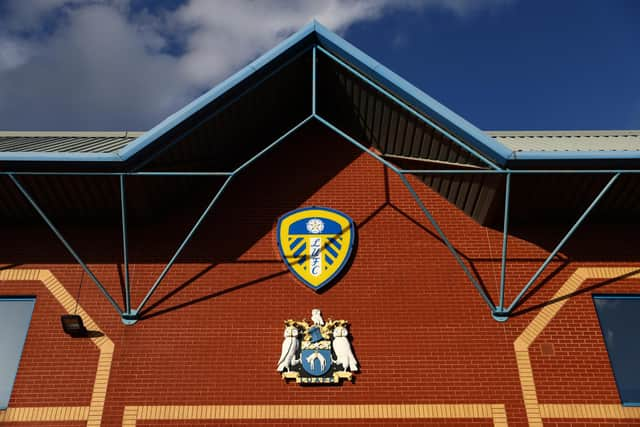‘Party over’ – Leeds United investors hear takeover alarm bells as Liverpool and Man United up for sale
and live on Freeview channel 276
The two giants of English football could receive new investment, or new owners altogether, after Fenway Sports Group and the Glazer Family, announced their intention to relinquish full control of Liverpool and Man United, respectively. Both clubs are currently owned by American groups, but Avram and Joel Glazer, as well as John W. Henry appear keen to exit the world of football club ownership based on recent declarations.
Two prominent American owners intent on selling is an interesting dynamic for Leeds United’s minority shareholders 49ers Enterprises. The San Francisco-based group have increased their holding in Leeds to 44 per cent over recent seasons, and talk of a full-scale buyout has been in the offing for some time with an agreement in place before January 2024.
Advertisement
Hide AdAdvertisement
Hide AdContrasting voices in the world of football finance have aired their views in the wake of Liverpool and Man United being put up for sale, meaning the 49ers will have been subjected to mixed messaging regarding their own sizeable investment. While some commentators deem the Premier League a product which remains ‘under-monetised’, others view the Glazers and FSG’s willingness to sell as a signal that the ‘party is over’ for wealthy US investment in English football.


The Todd Boehly-led £2.5 billion acquisition of Chelsea earlier this year put an end to Roman Abramovich’s reign as Chelsea financier, indicating that American investors may still look upon Premier League clubs as a worthwhile purchase. Although, FSG and the Glazers’ longevity in English football suggests they may be better placed than Boehly to analyse specific market trends.
"Fenway getting out would be a significant signal to the market, it would signal to some that the party was over in some ways," economist Stefan Szymanski, author of 'Soccernomics' and Professor of Sport Management at the University of Michigan said, via the Liverpool Echo.
"The pandemic devastated European football's bottom line, according to UEFA the total lost revenues were in the region of €5bn. That created a huge hole, and if you take a huge hole out of football clubs they are basically bust. They were more or less bust going into COVID. That meant that there was an opportunity for the gap to be filled by capital from private equity. People have been coming in and buying assets on the cheap.
Advertisement
Hide AdAdvertisement
Hide Ad"The whole premise of private equity is go in, hang around five years and get out. Restructure the business, cut costs, refocus on your core activities and then sell out. What might happen is these private equity guys might go in and in five years time realise that there is no money in it. What that says to me is that the source of this investment will disappear when that realisation sinks in, so the likelihood that American private equity coming in will be a fairly short-lived phenomenon until they learn the lessons that generations have learned going in to football not knowing," Szymanski added.
On the other hand, Colin Neville of Raine Group, the US firm credited with Chelsea’s Boehly marriage, said at the Financial Times' US Business of Sport Summit in New York last month: "When we sold Chelsea earlier this year we had people from six out of the seven continents, all the continents besides Antarctica, looking to buy the club.
"These are global businesses. These are still under-monetised leagues. The Premier League is still the biggest league and the biggest sport in the world and it is significantly under-monetised relative to what it should be," Neville said.
Leeds supporters have queried the 49ers’ endgame at Elland Road. While fears over private equity firms purchasing a stake in English football clubs for their own gain is a valid one, the 49ers’ activity has not matched that of a typical private equity investment vehicle. As outlined by Szymanski, private equity firms often view football clubs as a lucrative money-spinning enterprise, rather than buying into what supporters want from ownership; on-pitch success, engagement and understanding.
Advertisement
Hide AdAdvertisement
Hide AdThe 49ers’ incremental investment lends itself more to a gradual, multi-stage buyout, and with an agreement in place with chairman Andrea Radrizzani, it appears the club will at some point be owned – in the majority – by 49ers Enterprises.
Nevertheless, the Glazers communicating their intent to sell a multi-billion-dollar entity such as Manchester United, just weeks after Liverpool’s own declaration is perhaps a signal that the golden age of Premier League club ownership may be coming to a crescendo, particularly in the case of those who are not backed by wealthy, oil-rich states. Leeds’ minority shareholders’ own proximity to this situation, insofar as all three groups are US-led, makes for an interesting dynamic over the coming 12-18 months at Elland Road.
Comment Guidelines
National World encourages reader discussion on our stories. User feedback, insights and back-and-forth exchanges add a rich layer of context to reporting. Please review our Community Guidelines before commenting.